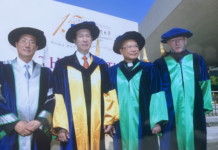For those of you who, like me, were busy over the summer, the latest edition of IRRODL (Vol. 10, No. 3) was published in June.
As Terry Anderson, the editor, pointed out,
‘it is the largest single issue ever published by IRRODL! The issue contains fourteen peer-reviewed research articles, two technical reports, and links to five recordings and Powerpoint slides from research presentations to IRRODL’s sister organization, the Canadian Institute for Distance Education Research (CIDER). It also contains two articles formatted for mobile devices (EPUB).’
One of the articles, Elbeck, M. and Mandernach, J. (2009) ‘Journals for Computer-Mediated Learning: Publications of Value for the Online Educator‘ attempted ‘to determine a comprehensive listing and relative value ranking of scholarly journals whose content informs online educators and motivates scholarship.’ On a combined ranking of three dimensions, popularity, importance, and prestige, IRRODL came out top (well, it would, wouldn’t it!?). Altogether 46 journals were ranked. IRRODL’s no. 1 ranking probably owes almost as much to its policy of open access as to its high quality editor and excellent peer review process.
I’m more and more looking for theme-led journal editions these days, as it helps pull together otherwise scattered research on the same topic at a time when information on e-learning research is more and more fragmented. However, this particular issue covers quite a rag-bag of different topics. I don’t have the time to review every article, and your interests may be different from mine, but the ones I looked at were:
Zawacki-Richter, O. (2009) Research areas in distance education: A Delphi study IRRODL, Vol. 10, No. 3
From the abstract: This study had three purposes: Firstly, to develop a categorization of research areas in distance education; secondly, to identify the most important research areas in distance education; and thirdly, to identify the most neglected research areas in distance education.
One conclusion Zawacki-Richter comes to is: The results suggest that there is a shift from technology-centered research to areas that focus on management and change in distance education institutions. He also comes up with a useful classifications system for areas of research in distance education, which is not too dissimilar from the areas I identified, more personally and subjectively, in my map of research in e-learning.
This will be a useful article for Ph.D. students (or their supervisors) looking for a topic area for a thesis. I’m still not convinced though of the benefits of Delphi studies, which rarely come up with results that would not be found in a good review of the literature.
Uzuner, S. (2009) Questions of culture in distance learning: a research review IRRODL, Vol. 10, No. 3
This is a hugely important topic. Uzuner focused on the following questions: ‘Does cultural hegemony also exist in distance education? Do conflicts resulting from cultural differences transfer from the traditional classroom to the distance learning environment? If so, how do teachers and students navigate different cultures of learning in these environments?’
Uzuner came up with some interesting conclusions (despite his criticism that most of the 27 studies reviewed had flawed research methodology):
- Researchers express broad agreement that the diverse cultural assumptions students bring to ALNs concerning how teaching and learning should be done bring about conflicts, disagreements, and frustrations. Not surprisingly, the issues dealt with in these studies resemble those faced by traditional classroom teachers who teach culturally and linguistically diverse students.
- good practices for culturally diverse online learning environments are good practices for others where teachers and students are operating within the same culture and space
- online instructors should be sensitive to cultural issues, become aware of the variations in students’ learning strategies, and avoid adopting the “one size fits all” approach when viewing the process of learning for their students in ALNs
Uzuner also identified from the research a number of practical suggestions for dealing with multicultural online classes. This is an article well worth reading in full.
These were just three cherries I pulled out of the pie. If you have the appetite, the whole pie is worth eating – well, most of it.









 Dr. Tony Bates is the author of eleven books in the field of online learning and distance education. He has provided consulting services specializing in training in the planning and management of online learning and distance education, working with over 40 organizations in 25 countries. Tony is a Research Associate with Contact North | Contact Nord, Ontario’s Distance Education & Training Network.
Dr. Tony Bates is the author of eleven books in the field of online learning and distance education. He has provided consulting services specializing in training in the planning and management of online learning and distance education, working with over 40 organizations in 25 countries. Tony is a Research Associate with Contact North | Contact Nord, Ontario’s Distance Education & Training Network.

